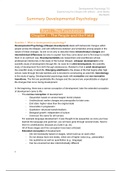Developmental Psychology TiU
Experiencing the Lifespan (5th edition) - Janet Belsky
MechteldC
Summary Developmental Psychology
-Part I - The Foundation-
-Chapter 1 - The People and the Field-
Question 1. What is developmental psychology?
Developmental Psychology (lifespan development) deals with behavioral changes within
people across the lifespan, and with differences between and similarities among people in the
nature of these changes. Its aim is not only to describe these intraindividual changes and
interindividual differences but also to explain how they come about and to find ways to modify
them in an optimum way. Developmentalists are researchers and practitioners whose
professional interest lies in the study of the human lifespan. Lifespan development is the
scientific study of development through life. Its roots lie in child development, the scientific
study of development from birth through adolescence. Related to that is adult development,
the scientific study of adult life. Emerging adulthood is the phase of life that begins after high
school, lasts through the late twenties and is devoted to constructing an adult life. Gerontology
is the study of aging. Developmental psychology deals with normative and non-normative
transitions. The first are predictable life changes and the second are unpredictable or atypical
life changes that occur during development.
In the beginning, there was a narrow conception of development, later the extended conception
of development came to life:
- The narrow conception of development:
- Sequential: based on several stages/ levels/ phases
- Unidirectional: earlier changes are prerequisite for later ones
- End state: higher value than the original state
- Irreversible in progression
- Qualitative: structural transformations
- Biological growth: independent of culture
- Universal: the same for all humans
For example language development: it was thought to be sequential, so once you have
learned the language and grammar, you will have gone through several levels. Next to
that it is unidirectional, because you build it up, etc.
All of these stages and this conception have been criticised.
- Extended conception of development:
- Are not necessarily based on stages, which build up on each other
- Do not always have end states, which are of higher value (e.g., personality)
- Are qualitative as well as quantitative (e.g., language)
- Can be universal but also interindividually different
1
, Developmental Psychology TiU
Experiencing the Lifespan (5th edition) - Janet Belsky
MechteldC
- Are affected by culture and biology
- Can be intraindividual modifiable and constrained (plastic)
Again we can use the example of language development: children can skip certain
phases etc. Nowadays this is the most commonly used conception of development.
Question 2. What develops when, how and why?
The “What” in developmental psychology
The biological, psychological and social domains interact with each other. Developmental
psychology focuses on normative development (behavior/physical skills that happen around
the same time for all individuals e.g. the age at which kids start walking) + individual
differences. Questions that occur are: Which deviations from the norm are likely? How can they
be explained? What do they mean for future life? Are they stable, are they changeable? How
can future developments be influenced in a favorable way? How can people be immunized
against harmful influences? How can we increase the probability of coping with adverse events?
The “When“ in developmental psychology: What develops when?
Important: Biological age is never responsible for and thus does not explain changes. Changes
can only be correlated with age. The goal is to link changes to “why”: which mechanisms drive
development?
We look at variability (= short-term changes that are more or less reversible) vs. change (=
more or less enduring). Variability can predict change.
There are two different ways to treat age:
- In a continuous way: age x ability correlation
- Compare specific age groups: mean age difference in ability X
2
, Developmental Psychology TiU
Experiencing the Lifespan (5th edition) - Janet Belsky
MechteldC
We can investigate:
- Individuals of different ages at one point in time: cross-sectional designs. Here we
measure interindividual differences.
Advantages:
- Economic in time (short duration between assessment
and results)
- Rather cheap
- Shows similarities and differences between age
groups
Disadvantages:
- Age effects confounded with cohort effects
- No information on individual trajectories (interindividual differences instead of
intraindividual change)
- Limited generalizability to other times of measurement
- The same individuals across different points in time: longitudinal designs. Here we
measure intraindividual change.
Advantages:
- True assessment of intraindividual change
- Assessment of stability and change of developmental
characteristics
Disadvantages:
- Age effects confounded with time-of-measurement
effects / retest effects / attrition effects
- Limited generalizability to other cohorts
- Long duration
- High costs
Cohort effects
A cohort is any group that shares having experienced the same cultural environment and
historical events (e.g., same year of birth). Cohort effects are differences in developmentally
relevant variables that arise from (non-age-related) factors to which each birth cohort is
exposed, this leads to observed results caused by cohort characteristics. An example is the
Second World War, people who grew up back then might have developed differently than
people growing up right now.
There is a way to combine cross-sectional and longitudinal designs. This is done by doing a
cross-sectional study but by also following these people in a longitudinal study. Here you can
see if differences that appear are true for all cohorts.
3
, Developmental Psychology TiU
Experiencing the Lifespan (5th edition) - Janet Belsky
MechteldC
There are different assessment methods (ways to measure development):
- Self-report vs. report by proxy (e.g. parent, spouse, caregiver): interview, questionnaires,
diaries;
- Behavioral observation (naturalistic versus structured);
- Standardized Tests/Test batteries (comparison to norms),
- Experiments (Comparison of age groups or experimental conditions with behavioral or
neuro-biological data as outcome).
Research challenges
In developmental research, we focus on age groups (infants, children, older adults) that may
differ from younger adults in:
- Speech reception and production
- Sensomotoric abilities
- Suggestibility
- Attention span/fatigue
- Subjective meaning of concepts
- Proportion of undiagnosed clinical impairment
This may pose research challenges. E.g., how are you going to gather data and what questions
do you have to ask (if they can even ask questions) in order for them to understand? You need
to adjust methods to the abilities of the individual. This can be done by:
- Age-adjusted task material (e.g., bigger font size)
- Oral responses instead of written
- Non-verbal task material
- Use of structured observation, physiological methods or report by proxies as alternatives
to verbal self-report
- Consider selectivity of sample (e.g., mobile older adults with high cognitive functioning)
- Response bias: social desirability, accuracy-speed trade-off, stereotypes
Question 3. Why and how do we develop? Nature versus nurture
Nature is the way you were born, nurture is the way you were raised.
4






